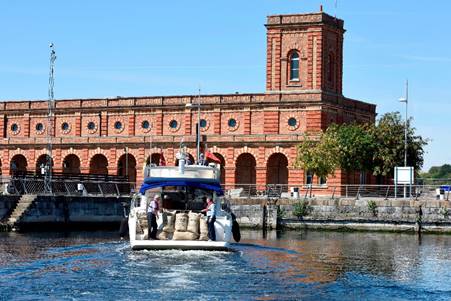Bob and Matthew Russell, co-founders of Kent’s Copper Rivet Distillery, speed their freshly harvested wheat, barley and rye back to their distillery on the shores of the River Medway in Chatham.
Within weeks of the grains arriving by boat at the distillery, they will have been ground, mashed, distilled, introduced to their chosen botanicals and bottled as Copper Rivet Dockyard Gin ready to meet their ice and tonic.
Matthew Russell said: “We are one of only ten gin distilleries, out of the 350 or so now in Britain, to make our own base spirit. And as the farms are so easterly and soak up the heat, we believe we will be among the first gins to showcase this year’s crop.
“The continuous sunshine this year has hit volumes, but from our perspective the quality is looking great. There will be less grain available this year, maybe 15% less from East Anglia, but the quality is looking high. Nitrogen levels should be around 1.6 to 1.8%, so not a problem this year. However, the germination of some lean grains could be an issue as 92% to 96% germination is required by maltsters. There’ll be fewer seeds with less energy in them which means less starch, less sugar and ultimately alcohol, but we won’t know the extent of this for a while”.
“Grown for us on the nearby Isle of Sheppey, the cereals will be used to create our Copper Rivet Dockyard Gin, our Vela Vodka, our Son of a Gun cask finished English grain spirit, and they will be aged for years in casks to make Masthouse Whisky.”
With the local Burden farming family, the Russells choose the individual fields in which their holy trinity of cereals will be grown, the wheat, the barley and the rye. This allows Copper Rivet to create a truly local Kentish spirit.
The neighbouring Chatham Dockyard was the birthplace not just of HMS Victory, but also of many of Britain’s oldest stills. So, in 2016, Copper Rivet’s distiller, Abhi Banik, commissioned his stills from Chatham, the patented gin still designed by himself, so as to get the maximum subtlety from his chosen botanicals.
This extreme control of ingredients allows its distiller, Abhi Banik, to control every element of his distillation process.




